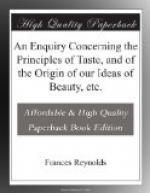As the virtues differ, in some degree, as the character of the sexes differ,[A] of course so must the sentiment of taste differ. To the man I would give the laws of taste; to the woman, its sensibility. The taste of the former seems more derived from reason; that of the latter from instinct: witness their impulsive maternal affection; that inherent ornament of their sex, modesty; their tender susceptibility of the benevolent virtues, pity, compassion, &c. &c.
[Footnote A: Vide page 23.]
Taste, however, is as far removed from mere instinct as from mere reason. I only mean to say, that the taste of the masculine character is rather on the side of reason, or the understanding; that of the feminine on the side of instinct, and, let me add, imagination. The taste of the one and of the other seems to differ as justice does from mercy, as modesty from virtue, as grace from sublimity, &c. &c. And, as exterior feminine grace is the most perfect visible object of taste, the highest degree of feminine excellence, externally and internally united, must of course constitute woman, the most perfect existing object of taste in the creation.
The cultivation of the social moral affections is the cultivation of taste, and the domestic sphere is the true and almost only one in which it can appear in its highest dignity. It is peculiarly appropriated to feminine taste, and I may say it is absolutely the only one in which it can appear in its true lustre. True taste, particularly the feminine, is retired, calm, modest; it is the private honour of the heart, and is, I imagine, incompatible with the love of fame.
In the present state of society, taste seems to be equally excluded from the highest and from the lowest sphere of life. The one seems to be too much encumbered with artificial imaginary necessities; the other too much encumbered with the real and natural necessities of life, to attend to its cultivation. It is in the former that taste is universally thought to reside, which is because the idea of taste is inseparable from that of honour. It is that, indeed, in which the general taste of the nation is exhibited. It is its face, as I may say, which expresses the internal character of the heart.
In this sphere, namely, the most exalted station of mankind, what true taste it does exhibit is placed in the strongest point of view; its contrary principles are also the same, particularly so to those who have been rightly educated at a distance from it; to such, the wrong will instruct as much as the right; but sure I am, that it is not, at this period, the proper sphere for the infant mind to expand and improve in. The wrong will be too familiar to the mind to disgust; and the right, which I imagine is chiefly confined to the records of taste in the fine arts, will be too remote (wanting the preparatory love of nature and virtue) to please.




